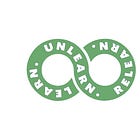How Not to Write
Insights From an Author on Writing Books, Articles, and Essays
Welcome to Polymathic Being, a place to explore counterintuitive insights across multiple domains. These essays explore common topics from different perspectives and disciplines to uncover unique insights and solutions.
Today's topic breaks down some common myths provided to writers as advice. From finding your niche to writing every day, to the ten steps for a best seller, we’ll break down the problems and offer alternatives to help you improve your writing or to get started on the adventure of authorship.
Intro
As you might expect from me, if you’ve been here more than a few weeks, I tend to violate a lot of the common mantras. Writing is just one more example of how my vision, style, and process contradict much of the established ‘wisdom’ typically provided to writers. Let’s start with what I’d recommend avoiding and then get into a few different ways to break into writing.
🎧Prefer to listen? You can find these essays on all major podcast players!
1. “Find your niche.”
This one drives me bonkers. It’s the first advice marketing gurus parrot, not working writers, and it suggests that you must choose a box early, whether that’s a genre, tone, theme, or audience, and then stay in that box to succeed. For new or exploratory writers, this can be paralyzing and prematurely limiting. It assumes that your voice, interests, and talents are already known and crystallized, and worse, that your primary goal should be niche market alignment rather than creative growth.
It also promotes the illusion that readers only want predictable content, underestimating audiences and neutering originality. For example, one of the most common compliments I get on Polymathic Being is that you’re never sure what topic is going to land in your inbox on any given Sunday, and that’s a fun surprise.
Therefore, my niche is nicheless, and these essays intentionally vary the topics so you’ll be pleasantly surprised by a totally new perspective. Whether it’s psychology, technology, philosophy, or leadership, the goal is to Learn, Unlearn, and Relearn.
So, write what you are curious about. If you don’t know anything about it, use your writing as motivation to learn new things. Go ahead, write horror, write essays, write a love story, write a sci-fi novel about AI and what it means to be human. Your niche may emerge, but don’t chase it like a branding exercise. Let it reflect what you actually care about, what you do well, and what keeps calling you back. When a niche becomes a pattern of curiosity, not a prison of marketing, that’s when you’ve found your lane, and that is a uniquely creative place to be.
2.“Outline everything before you start.”
Outlining is great for some, but over-structuring too early can stifle discovery and spontaneity, especially for intuitive writers. Just prior to starting to write Paradox, I synthesized the insight that “good writing should surprise the author.”
This gave me the freedom to let go of the outlines, worldbuilding, and character plotting and let these things explore themselves while I wrote. The result was a relationship between the main characters, Kira and Noah, that I couldn’t have planned had I tried. I was genuinely surprised multiple times at how the narrative twisted and wove in a natural, organic, and fun-to-read way.
Outline if it helps, free-write if it frees you. Find the process that supports your flow and allows your characters to explore. This also works for non-fiction, as many of the counterintuitive insights we uncover here aren’t planned. It’s just me, playing with topics, exploring new domains, and being surprised at what I found.
“Good writing should surprise the author.”
3. “You have to write every day.”
This one sounds great. Consistency is key, and all that stuff. A discipline regimen is a good way to maintain momentum; that is undoubtedly true. However, creativity doesn’t happen on a daily timer, and life does happen. Don’t turn missed days into a guilt trip.
You also don’t have to set aside time to write specifically. In fact, I blend my Substack writing into my daily work and life. I’ve got 10 tabs with essays or essay ideas open on my computer at all times. When I’m at work, I’ll sometimes have an idea and a spare 15 minutes of downtime, and take a microbreak to write. Othertimes, someone will share a piece of information and I can drop it into my work in progress and not lose the idea while not interrupting my work.
I’m also a binge writer. I wrote the first draft of Integration in 21 days. That was 18 Chapters and 95,000 words in 21 days. This Substack is similar. Those fractional essays build up over time and then, suddenly, one day I can knock out 6-8, sit down and record the voice-overs as a final editing pass, and schedule them out for the next month(s). This technique reduces the pressure of publishing, as I can start looking at new topics and researching new things that interest me without a looming deadline
Don’t become a slave to a schedule if that’s not your style. Integrate writing into your life and let it become a fusion and expression of who you are. That freedom allows me to capture many of the topics we’ve explored because it’s organic, not scheduled.
4. “Just start writing.”
Actually, this is pretty good advice. Sometimes, you need to get out and start with something. When I started writing Paradox, my wife told me just to start. It was terrifying, and yet she was right. Getting something on paper can get you going.
For Paradox, I used ChatGPT's new capabilities to generate some ideas. The output was terrible, but that was a blessing because it allowed me to find my unique voice, focus on human-centric creativity, and set the stage to differentiate all of my writing from the shocking overuse and reliance on AI that we see permeating the authoring world today. Don’t let AI replace you, let it augment you.
Counterintuitively, AI taught me how to write better as a human. It was also useful to act as a quick-response editor, where I didn’t have to lose my flow to run counterarguments, avoid overused tropes in my narrative, and other traps that new authors encounter when starting. AI augmented my writing; it didn’t replace it, and it certainly highlighted the unique value of human-created content. Check out this quick video to learn more:
5. “I’m Writing for Me.”
I won’t deny that this one is probably one of the most ignorant ideas out there, with a tiny grain of truth. Here on Polymathic Being, I am writing for me. It’s for my own exploration, creative outlet, and self-help. Any topic that offers advice is first applied to me before I consider sharing it with you. So, in a way, I do write for myself.
There’s also the other extreme where people turn to Algowhoring in an attempt to create content, any content, and especially content that inflames to build a following. Just like the dime-a-dozen influencers on Instagram and TikTok, these writers will sell their souls for a like and not consider the consequences.
That said, I see a lot of writers turning the ‘writing for me’ mantra into an excuse for a lack of growth or engagement. That’s because good writing isn’t about you. At its most basic, published writing needs to resonate with the reader and speak to their soul. It’s also about uniting people around a common story, transferring knowledge so others can be better, and sharing ideas to make better ideas. Writing is about leveraging humanity’s superpower of social learning so that we all grow together.
Writing for yourself, outside of a diary, is at best a coping mechanism for limited reach and, more likely, an indication of why your reach may be limited. Good writing should surprise the author, but better writing should resonate with the audience. And, dear reader, this is why I love the comments you provide and the engagements I have with you. I only learn so much writing for me. I learn a lot more by figuring out how to write for you. It stretches my understanding, empathy, and appreciation for diversity as we interact together. (p.s. comments and ❤️ are amazing!)
6. “Follow these steps to write a bestseller.”
Growing is tough because in both Polymathic Being and the Singularity Chronicles, it is a slow burn. We Substack authors joke that the fastest way to grow and make money on Substack is to write a Substack on how to grow and make money. Those advice authors are everywhere, regurgitating tropes like I’m disabusing you of, and using AI-generated content without any human connection.
When coupled with finding a niche, these how-to formulas drive authors to chase the ‘current thing’ and stoke outrage, create division, and profit from tribalism. Heaven knows it works, as I’ve written several essays on avoiding those grifters. Be wary of formulas for bestseller advice as they often trade your craft and voice for algowhoring.
I’d love to be a bestselling author, but I won’t do it at the cost of my craft, my vision for providing human-centric explorations, or my ethics. It might take me longer, but I’m proud of what I’ve created. I’m learning the art of writing deeply and making bold choices while enjoying the process. Success will be a consequence, not the motive.
With these problematic tropes out of the way, let’s go ahead and focus on some usable insights for any writer to use.
Real Tips for Writers:
Write: You’ll start writing badly, but start to put material out there on topics that interest you and start learning to form, unform, and reform ideas.
Study: As you read material you enjoy, pause and study what you like about it. Is it the ideas? The prose? The tempo? Document what you like and try to emulate it. Over time, you’ll ingest what you like while also finding your own voice.
Collaborate: Some of the most fun I’ve had is writing with authors like Andrew Smith, Joshua Deiches, C.J. Unis, Andrew Perlot, Chris Guest and more. I’m constantly seeking collaborative opportunities because writing with someone else also helps refine my thoughts, ideas, and craft.
Explore: Don’t write about what you know. Write about what you don’t know and use that to learn. This helps keep things interesting while avoiding burnout from discussing the same thing. Stretch your brain!
Market: Growth is about marketing. It’s about finding groups, discussing your work, spending money on promotion, and learning to write for others in a way that isn’t algowhoring. The bottom line is that becoming a successful author is 75% marketing and 25% on your writing.
Summary
Writing is hard; putting myself out there for public critique and evaluation takes a lot. I have to have a thick skin as we turn sacred cows into burgers, and when I poke at the misinformation and psychological operations that permeate our social media. It takes effort to sit down and delve into the broad variety of topics, as well as conduct the research and world-building for The Singularity Chronicles.
That said, I love to write. I love exploring counterintuitive insights. I love to share these insights with you. I love to hear from you how you’ve benefited from these insights. It’s been fun having you along for the ride, and I appreciate each and every one of you. You’re what makes writing so rewarding.
Did you enjoy this post? If so, please hit the ❤️ button above or below. This will help more people discover Substacks like this one, which is great. Also, please share here or in your network to help us grow.
Polymathic Being is a reader-supported publication. Becoming a paid member keeps these essays open for everyone. Hurry and grab 20% off an annual subscription. That’s $24 a year or $2 a month. It’s just 50¢ an essay and makes a big difference.
Further Reading from Authors I Appreciate
I highly recommend the following Substacks for their great content and complementary explorations of topics that Polymathic Being shares.
Goatfury Writes All-around great daily essays
Never Stop Learning Insightful Life Tips and Tricks
Cyborgs Writing Highly useful insights into using AI for writing
Educating AI Integrating AI into education
Socratic State of Mind Powerful insights into the philosophy of agency








Love this one! But I have a different interpretation of the "I'm writing for me" advice. I think the idea of that is to write about your unique, "Spiky Point of View," a term coined by Wes Kao who wrote a whole post that I wrote about it in "Dare to Disagree: The Importance of Having a Spiky Point of View, How To Find It, and Building the Courage to Share It: https://technosapien.substack.com/p/spiky-point-of-view
In fact, I'd argue this post is a great example of a Spiky Point of View, which one of your commenters points out that these are based on your view -- that's what I love to read; fresh points of view.
Really good examples. I like how you undermined a lot of the ‘easy’ advice.